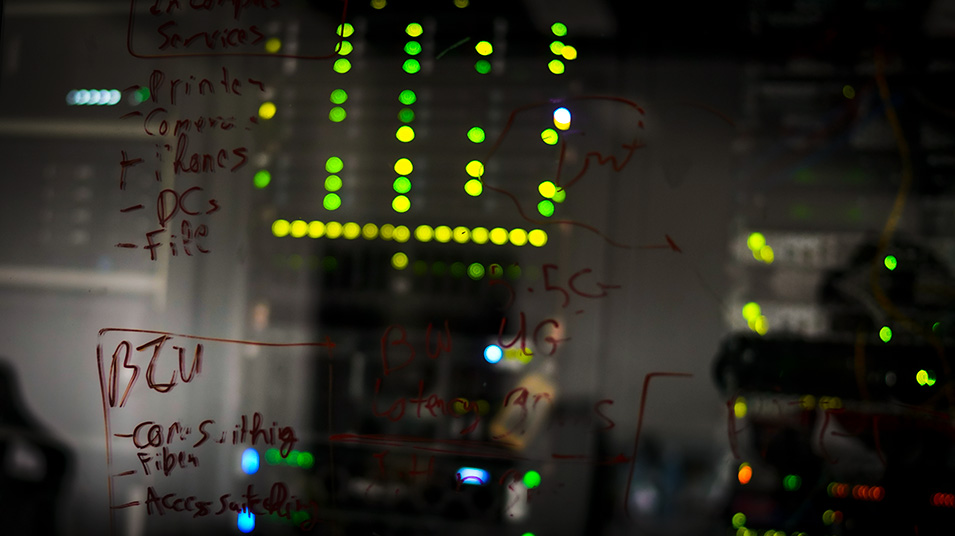Embracing online learning during the SARS-CoV-2 outbreak
As the novel coronavirus has overtaken the world by storm, the impact is felt particularly in education, forcing institutions to engage in experimentation with remote teaching. Birzeit University has early on and proactively joined what might be the world’s most immense remote learning experience.
Around three weeks into the “experience,” the university has offered online education to more than 14, 500 students, both at the undergraduate and graduate levels, with attendance rates reaching up to 77 percent.
Globally, researchers and experts cite indicators showing that COVID-19 may permanently transform numerous aspects of life, education among them. Aziz Shawabkeh, the assistant to Birzeit University’s president, confirms that the pandemic outbreak poses a host of challenges to the entire world, especially universities. He explains, “This challenge has encouraged us to develop and put into action the university’s E- and interactive learning methods. We have taken constructive approaches to minimize the impact of the outbreak and embarked on online teaching in mid-March to benefit the university’s students and put into action our values as a community of life-long learners.”
“So far, the university’s experience has proven to be a success,” Shawabkeh assures.
Embracing technology to stay connected
Given the limited window of time available, Birzeit University’s success rate was contingent also on the openness to make new investments into infrastructure and online servers.
Thus, on April 2, 2020, president of Birzeit University Abdullatif Abuhijleh announced that the university would invest $250,000 into the improvement of its technical capabilities. As currently, all lectures and daily schedules are carried out via virtual meetings, technical issues must be addressed to facilitate the emergency remote-learning experience. This decision, Shawabkeh asserts, falls in line, however, with the university’s responsibility to serve the needs of education and combat the spread of COVID-19.
The university’s information technology department is developing the institution’s infrastructure and bandwidth capacities to ensure that all students get the same, or almost the same, delivery of online education. The use of open-source programs, such as Moodle, BigBlueButton, and Zoom, aims to provide solutions that address digital inequalities among students, as these programs are available free of charge and provide easy access for all students and faculty members.
Rising to future challenges with open-loop education
Internet connection troubles, the limited opportunities for class discussion, and the general strangeness of the situation are making it more difficult to learn. Nevertheless, Shawabkeh assured, the university is moving forward with providing the best possible education – despite the gloom that hangs over the COVID-19 era, and even though many Palestinians, including students and professors, are anxious over how the pandemic will play out. He emphasizes that Birzeit University believes that “Only by working together, we will continue to bring forward the next generation of leaders who will help build a safer, better, and more inclusive world.”
"Our faculty members must not only adjust dramatically both course contents and schedules, but also make sure that all students are evaluated equally," Shawabkeh asserts. He affirmes that the university administration has taken a number of decisions to make these challenges easier for both students and faculty members.
Since the the state of emergency was declared on March 5 in Palestine, the university has developed comprehensive guidelines on how to conduct fair and transparent teaching, including examinations and assessment, under the current circumstances.
Furthermore, Birzeit University has looked for ways to be more flexible in dealing with the current challenges. On March 21, president Abuhijleh sent a letter to students to announce that pass-fail systems are in lieu of grades and assignments and short research papers are taking the place of exams. Also, the university has given students the option to re-enroll in a course they did not pass this semester.
Shawabkeh assures that the university is making all efforts possible to help students complete their semester. “The challenges become surmountable when the entire academic community engages together in the spirit of mutual support and unity for which Birzeit University is famous,” he asserts.
Birzeit University's online experience is an example of how universities can diversify the provision of their students beyond boundaries.







